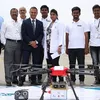Affordable test methods to drones: Institutions take the innovation route to aid coronavirus fight
While over 20 technical and scientific institutions are working on developing a vaccine for coronavirus, IITs have already set up "COVID-19 specific research centres", encouraging developments in the innovation ecosystem.
From affordable coronavirus testing methods to robots delivering food and medicines in isolation wards, drones for sanitising large areas to UV-fitted containers for sanitising grocery items, various institutions in the country are following the innovation mantra to aid the fight against coronavirus.
While over 20 technical and scientific institutions are working on developing a vaccine for coronavirus, IITs have already set up "COVID-19 specific research centres", encouraging developments in the innovation ecosystem.

Indian Institute of Technology (IIT) - Delhi, has become the first institute in the country to develop an alternative clinical testing method for the virus, which has been approved by the Indian Council of Medical Research (ICMR).
The current testing methods available are "probe-based", while the one developed by the IIT team is a "probe-free" method, which reduces the testing cost without compromising on accuracy.
"The method can be easily scaled up as it does not require fluorescent probes. The team is targeting large-scale deployment of the kits at affordable prices with suitable industrial partners as soon as possible," IIT-Delhi Director V Ramgopal Rao said.
Researchers at the Indian Institute of Science (IISc), Bengaluru, are working on a tool for diagnosis of COVID-19, based on respiratory, cough, and speech sounds.
The tool, once validated, will offer a test that will pose minimum risk of exposure to healthcare professionals and give results faster than the current testing method.
Meanwhile, a university in Rome is conducting a pilot run for a patented artificial intelligence-based tool, developed by three biotechnology students and a professor from Mumbai, which they claim can test COVID-19 through voice-based diagnosis using a smartphone.
The tool is being tested by the University of Tor Vergata in Rome. It has already been tested on 300 individuals and has yielded 98 percent accurate results.
A special infection-proof fabric for usage in hospitals, low-cost coronavirus testing kits, isolation pods for coronavirus-infected patients, bubble helmets that can be an alternative for the traditional oxygen masks, and pendants to raise an alarm on a breach of social distancing are also among the innovative ideas that have been given shape since the coronavirus outbreak in the country.
IIT-Ropar has developed a trunk-shaped device fitted with ultraviolet germicidal irradiation technology, which it recommends be placed at doorsteps, and all items brought from outside, including grocery and currency notes, put in it for sanitisation.
An IIT-Bombay startup has developed a "digital stethoscope" that can listen to heartbeats from a distance and record them, minimising the risk of healthcare professionals contracting the novel coronavirus from patients.
The data or the auscultated sound from a patient's chest is wirelessly sent to the doctor using Bluetooth, doing away with the need to go near to take readings, according to members of the team.
IIT-Madras has come up with "negative pressure medical cabins" under the rapid shelter system, where one can quickly deploy a reusable medical cabin speciality for contagious diseases. Another product at an advanced stage is a surveillance wide-angle camera that can be installed at strategic public spaces to detect and alert people with high temperatures, then zoom in to detect for other symptoms.
An IIT-Roorkee professor claims to have developed a software that can detect COVID-19 within five seconds, using an X-ray scan of the suspected patient. The professor, who took over 40 days to develop the software, has filed a patent for the same and approached the ICMR for a review.
A group of researchers at IIT-Guwahati has developed a drone for disinfection of larger areas, while another group has come up with a drone equipped with an infrared camera, which can help in the thermal screening of groups without human intervention and identify suspected COVID-19 cases at an early stage once the lockdown is lifted.
"The drone also has a loudspeaker, which can be used by personnel to monitor places, especially with a high disease prevalence, and give appropriate instructions," IIT-Guwahati Director T G Sitharam said.
The death toll due to COVID-19 rose to 824 and the number of cases climbed to 26,496 in India on Sunday, according to the Union health ministry. The death toll increased by 45 and the number of cases by 1,554 since the ministry had last updated its data on Saturday evening.
The number of active COVID-19 cases in the country stood at 19,868, while 5,803 people have been cured and discharged, and one patient has migrated, the ministry said.
Edited by Suman Singh








